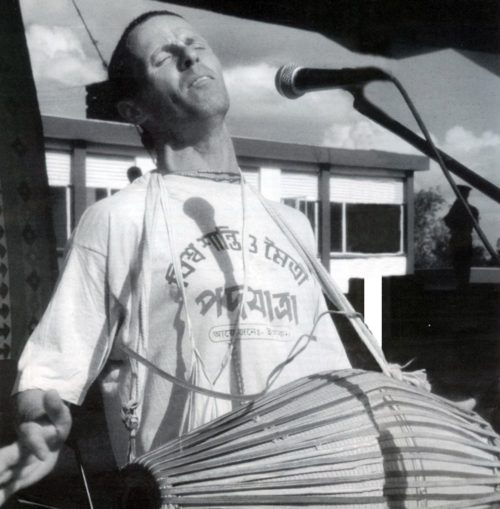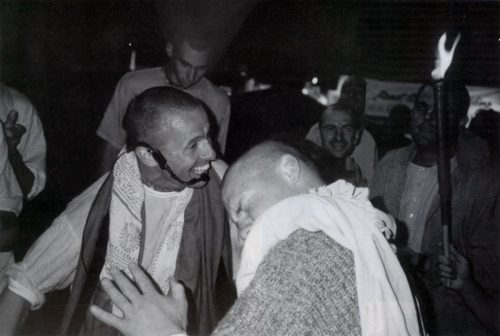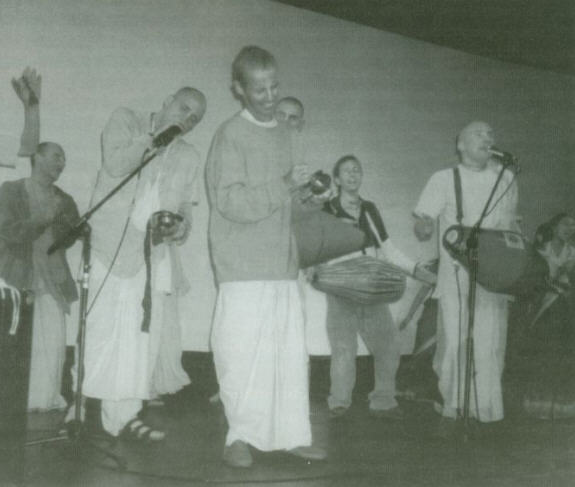Devotees remember a departed friend, guide, and inspiration.
Tribhuvanatha Dasa passed away on October 16, 2001, from cancer. On the one-year anniversary of his passing, some devotees who knew him well sent us the following recollections.
Memories of a Dear Godbrother
by Ranchor Dasa
Tribhuvanatha Dasa, born in 1953 in Longford, Ireland, as Thomas Heggarty, was one of life's great individualists. All his life he stood out from the crowd. His charm and good humor contrasted with his sheer strength of character and fearless demeanor. Nothing was too much for him, and nothing dismayed him.

Tribhuvanatha Dasa
Misfortune dogged Tom's early life, much of it spent in and out of care homes in Ireland, which left him only semi-literate. By the age of sixteen he had arrived in London with his elder brother in search of adventure and drawn to Eastern mysticism. Almost at once he met Hare Krsna devotees and visited their London temple. He spent the day helping out, and when night fell and the community went to bed, he found himself back on the street. When the lights came on at 4:00 A.M. the next morning, Tom was waiting outside the front door to be re-admitted. He had slept that first night of his new Krsna life in a park near the temple. That was to be typical of his abiding sense of renunciation and dedication. That very day he was accepted into the community, and he at once threw his boundless energy into his new vocation.
By the time I joined the temple six months later, Tribhuvanatha was the mainstay of the temple workforce. If anything needed doing, he did it, and if any of us needed an example of what it meant to be fully absorbed in the service of Krsna, we had only to look to him. He was particularly good at giving out encouragement. Irrepressibly cheerful and always able to look on the positive side, he had the knack of putting across the philosophy of Krsna consciousness in a way that was memorable and practical, and totally sincere, despite his lack of formal education.
One day, shortly after I moved in, we were invited to the London School of Economics to make a presentation on Krsna consciousness. The LSE was a well-known melting pot of radical politics, and the students there were a tough audience. After we had chanted, Tribhuvanatha's talk held a large group spell-bound well beyond their lunch-hour, entertaining and instructing them in equal measure.
Tribhuvanatha's greatest love was to chant Hare Krsna on the street and play the drum. He would chant for hours, belting out the maha-mantra and pounding the drum as if his life depended on it, which in his mind it surely did. Anyone who saw him in full flow would be moved by his deep outpouring of devotion. Many days he would be worn out from long hours of work and too little sleep, but he would go out on the street, morning and afternoon, dragging us behind him. Seeing his example was enough to make us want to raise our own efforts. He showed us what was possible.
Gratitude For Guru's Grace
A key to Tribhuvanatha's unflagging energy was his love for his spiritual master, Srila Prabhupada. He considered that his guru's grace had saved him from disaster, and so his obedience to Prabhupada was unconditional.
When I first joined the temple I often used to hear Tribhuvanatha begin, "Prabhupada says." and then quote a suitable saying for the occasion. I asked him when he had heard all these things from Prabhupada. He was surprised.
"I haven't met Prabhupada yet," he replied, "but I've read all these things in his books."
We all read the same books, but with him, Prabhupada came to life.
The following summer, in 1971, Prabhupada came to London, and most of us met him for the first time. Tribhuvanatha was selected to give him a garland at the airport. In the weeks that followed, and in subsequent years whenever Prabhupada came, I saw he always had eyes especially for Tribhuvanatha. I wasn't the only one to notice this. We all knew that Prabhupada had special affection for Tribhuvanatha.
In 1973, on Prabhupada's first visit to Bhaktivedanta Manor, we were chanting Hare Krsna at the end of his Bhagavad-gita lecture. Prabhupada looked grave. Soon Tribhuvanatha stood up right in front of Prabhupada, playing a mrdanga drum, dancing his unique flat-footed dance, his back straight and erect like a trained actor, his weight back on his heels, and his feet beating the ground, while his head nodded up and down. His eyes met Prabhupada's, and suddenly they were both laughing with each other in perfect harmony.
In the years that followed I seldom saw Tribhuvanatha. Prabhupada called him to India to help lay the foundations for ISKCON's temples there, and after that he just kept traveling and preaching. But I will always remember him as he was on that day in 1973: laughing for sheer joy before his beloved spiritual master.
Taking the Gita to the Arab World
by Addha Dasa
In 1978 Tribhuvanatha recruited a fearless and determined group of brahmacaris Avinascandra, Nikhilananda, Maha-kratu, and Padmapani to travel to the Middle East to distribute the just-published Arabic translation of Bhagavad-gita As It Is.While driving from London to Beirut, they were held at knifepoint in Ankara and stranded without money in Istanbul for nine days with a broken-down van. They managed to survive by selling their large stock of "Change of Heart" tapes from shop to shop. Finally they made it to Beirut in the middle of a civil war.

Glastonbury Music Festival, England 1998
In Beirut, Srila Prabhupada's books were much appreciated in the wealthy Christian areas, where it was safe to wander about. Once, though, when the devotees strayed into a Palestinian area, some heavily armed PLO men stopped them, piled onto their car, and ordered them to drive to the PLO command post. The devotees were questioned one by one, but Tribhuvanatha saved the day by convincing the PLO that they were friends of Ravanari, a Palestinian devotee.
In his desire to please Prabhupada, Tribhuvanatha had failed to warn his colleagues of the extremely hazardous nature of their venture. Still, some devotees stayed on in Beirut and risked their lives distributing the Gitas. Those who stayed were all arrested and tortured at some point.
Nikhilananda: "It was Tribhuvanatha's principle to spend all the money he had on preaching, printing books, etc., to make sure it was used for Krsna. So we never had any money. In the beginning we lived in the poorest part of town, with rats in the shower room, next door to an Arab guerrilla base. We were in the midst of bombing, tanks, and machine-gun fighting all the time. In one week, the Syrians, who were involved in Lebanon's civil war, fired fourteen hundred rockets on a part of town where we had just sold our books.
"Every evening some Arab soldiers of various groups raided our flat to see what we were doing. But they would usually put aside their machine guns and sit down with us to sing the maha–mantra. They really liked doing kirtana with us and went wild about it. The only problem was how to stop the kirtana after a few hours without making them angry. We tried to smile all the time. And we depended on Srila Prabhupada."
Arrested In Damascus
Tribhuvanatha once traveled to Damascus to look for a devotee delivering money from the West. Because that devotee was carrying a large amount of foreign currency, he was suspected of being a spy and arrested. Tribhuvanatha's enquiries about him raised suspicions, so he was arrested too. He was held in a hellish dungeon for a month. His prison was a damp cellar without windows or lighting and with no room to stand. He was fed only an occasional bowl of watery soup with a piece of mouldy bread, which he described as being not fit for a dog. Fortunately, because of his Irish nationality his jail time was relatively short.
One time in Beirut during 1978, some devotees, after being held for a week by guerrillas, were released. Tribhuvanatha greeted them on their return.
"Alive and well!" he said.
He was so relieved. A bright smile wreathed his face.
"Nikhilananda! Padmapani! You're alive! We thought that you had gone back home, back to Godhead."
Later on, other devotees traveled to the Persian Gulf to raise money for spreading Krsna consciousness in the Arab world. Devotees came and went over the years, but Tribhuvanatha was the guiding force on behalf of Srila Prabhupada, and the person who held it all together.
A Temple In Cairo
After all the books had been distributed, Tribhuvanatha wanted to open a temple in Cairo, but there was no money. He handed Padmapani a pile of photos of ISKCON temples and asked him to try to get help from Indians living in Kuwait. He was sure that when they saw what ISKCON had done in other places, they would be happy to help start a temple in Cairo.
Tribhuvanatha bought him a ticket, and he landed in Kuwait with five US dollars in his pocket and only a vague idea of what to do or where to go. Armed only with faith in Srila Prabhupada and in Tribhuvanatha's words of advice, he was successful. He returned from Kuwait a week later with US $2,000 to start a Cairo center. It wasn't long before Tribhuvanatha was holding regular programs at the local university and in the small temple in Zamalek, a suburb of Cairo.
Nikhilananda summed up the whole experience: "When you're with devotees like Tribhuvanatha Prabhu, life is very intense and you feel Srila Prabhupada's presence always."
The Festival Organizer
by Kirti Kishor
In 1987 Tribhuvanatha started arranging Hare Krsna festivals throughout the United Kingdom. He and his small crew would often visit two towns or cities a month, putting on festivals after a few weeks of advertising and street chanting.

Brighton England - 2001
In 1991 Tribhuvanatha returned to his homeland when he was put in charge of the Inis Rath Island Temple in Ireland. After rescuing the temple from the brink of insolvency, he began organizing preaching activities all over Ireland, and with his festival crew opened a center in Dublin. When the devotees would go to the annual Feila festival, trouble-makers would throw beer cans at them and try to pull their tent down. Tribhuvanatha relished the adventure and madness of it, taking every opportunity to inspire people to chant and dance and take prasadam. The kirtanas were what really kept things going. They were Tribhuvanatha's trademark. No matter what happened, the holy name was victorious.
African Festivals
During this period in Ireland, Tribhuvanatha met a devotee who had traveled in east Africa and who invited him to visit there. After seeing Kenya, Tanzania, and Uganda, Tribhuvanatha became inspired to travel there with other devotees and do a festival tour. The first African tour was in 1995, and there has been at least one tour a year since then, with devotees coming from all over the world to take part.
The festivals reached Kenya, Tanzania, Uganda, Zambia, Malawi, and Zimbabwe, in universities and colleges, public stadiums, parks, halls, theaters, hotels, and Hindu temples. Once, at a festival in Mwanza, Tanzania, the whole town over ten thousand people came to the festival in a stadium. The kirtana beat out powerfully for hours, and everyone danced.
With much time and effort, Tribhuvanatha helped open a temple, a farm, and an orphanage school in Kampala, Uganda.
In Kenya, Tribhuvanatha inspired Krsna-mayi Devi Dasi, an Indian devotee who lives in Kisumu and who regularly helped out at local orphanages, to open her own school. In 2001 Krsna-mayi opened an orphanage called Little Gokula Education Centre, dedicated to Tribhuvanatha Prabhu as the patron saint. He remains the main inspiration behind it. The school educates and cares for 180 African children, mainly orphans and street kids. Some of these children met Tribhuvanatha, and all love him, as he loved everyone.
After some years in Ireland, the festival crew moved back to England to help a small struggling temple in the north and do festivals there again. Now the crew holds UK festivals during the summer and an African tour during the European winter.
Because of illness, Tribhuvanatha eventually had to stop organizing the festivals. At the last festival he attended, he instructed his crew to carry on with the festivals whatever happened.
"That's all I'm about," he said. "That's all I've ever been about. It looks like a bunch of people jumping around, having a laugh, a good time, but it's Krsna's trick to enter their hearts. Just as someone can sneak into your house without your knowing it, so by these festivals and kirtanas, Krsna sneaks into their hearts. I'll always be at the festivals, and as Prabhupada said, Narada Muni will always be there."
Online Extra
An account of Tribhuvanatha's passing is at www.krishna.com/371
